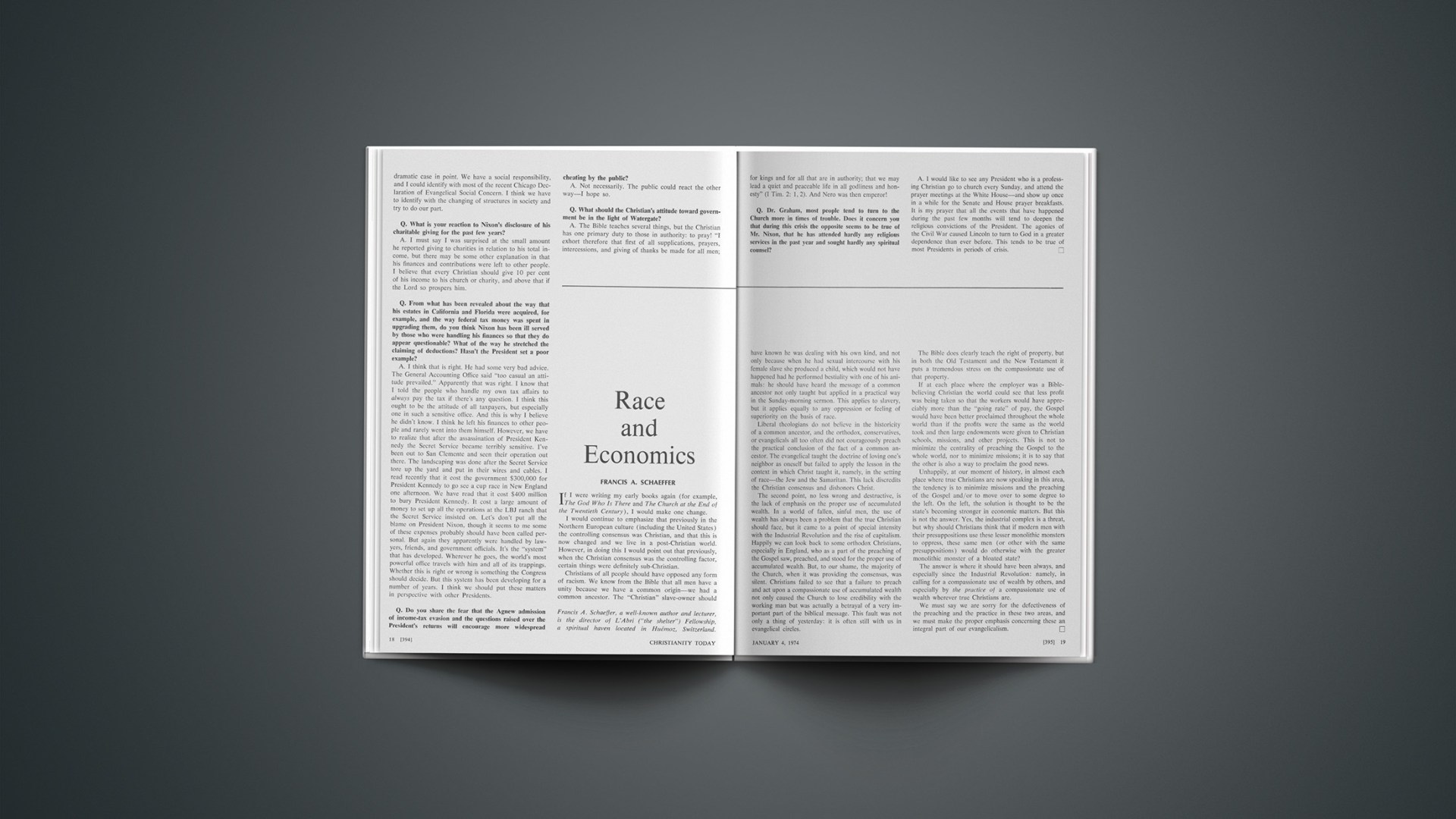If I were writing my early books again (for example, The God Who Is There and The Church at the End of the Twentieth Century), I would make one change.
I would continue to emphasize that previously in the Northern European culture (including the United States) the controlling consensus was Christian, and that this is now changed and we live in a post-Christian world. However, in doing this I would point out that previously, when the Christian consensus was the controlling factor, certain things were definitely sub-Christian.
Christians of all people should have opposed any form of racism. We know from the Bible that all men have a unity because we have a common origin—we had a common ancestor. The “Christian” slave-owner should have known he was dealing with his own kind, and not only because when he had sexual intercourse with his female slave she produced a child, which would not have happened had he performed bestiality with one of his animals: he should have heard the message of a common ancestor not only taught but applied in a practical way in the Sunday-morning sermon. This applies to slavery, but it applies equally to any oppression or feeling of superiority on the basis of race.
Liberal theologians do not believe in the historicity of a common ancestor, and the orthodox, conservatives, or evangelicals all too often did not courageously preach the practical conclusion of the fact of a common ancestor. The evangelical taught the doctrine of loving one’s neighbor as oneself but failed to apply the lesson in the context in which Christ taught it, namely, in the setting of race—the Jew and the Samaritan. This lack discredits the Christian consensus and dishonors Christ.
The second point, no less wrong and destructive, is the lack of emphasis on the proper use of accumulated wealth. In a world of fallen, sinful men, the use of wealth has always been a problem that the true Christian should face, but it came to a point of special intensity with the Industrial Revolution and the rise of capitalism. Happily we can look back to some orthodox Christians, especially in England, who as a part of the preaching of the Gospel saw, preached, and stood for the proper use of accumulated wealth. But, to our shame, the majority of the Church, when it was providing the consensus, was silent. Christians failed to see that a failure to preach and act upon a compassionate use of accumulated wealth not only caused the Church to lose credibility with the working man but was actually a betrayal of a very important part of the biblical message. This fault was not only a thing of yesterday: it is often still with us in evangelical circles.
The Bible does clearly teach the right of property, but in both the Old Testament and the New Testament it puts a tremendous stress on the compassionate use of that property.
If at each place where the employer was a Bible-believing Christian the world could see that less profit was being taken so that the workers would have appreciably more than the “going rate” of pay, the Gospel would have been better proclaimed throughout the whole world than if the profits were the same as the world took and then large endowments were given to Christian schools, missions, and other projects. This is not to minimize the centrality of preaching the Gospel to the whole world, nor to minimize missions; it is to say that the other is also a way to proclaim the good news.
Unhappily, at our moment of history, in almost each place where true Christians are now speaking in this area, the tendency is to minimize missions and the preaching of the Gospel and/or to move over to some degree to the left. On the left, the solution is thought to be the state’s becoming stronger in economic matters. But this is not the answer. Yes, the industrial complex is a threat, but why should Christians think that if modern men with their presuppositions use these lesser monolithic monsters to oppress, these same men (or other with the same presuppositions) would do otherwise with the greater monolithic monster of a bloated state?
The answer is where it should have been always, and especially since the Industrial Revolution: namely, in calling for a compassionate use of wealth by others, and especially by the practice of a compassionate use of wealth wherever true Christians are.
We must say we are sorry for the defectiveness of the preaching and the practice in these two areas, and we must make the proper emphasis concerning these an integral part of our evangelicalism.










